Hot Stove #50 – Hitler, the Klan and Baseball
“Why did Hitler get hit with a baseball? He did ‘Nazi’ it coming.”
That was an old joke about Hitler underestimating the Allies.
Another one: “Three Reichs and you’re out!”
To continue with the baseball metaphors/puns, the recent events at Charlottesville show that this game is still in extra innings. I did ‘Nazi’ it coming. Well, in some ways I did. All of the talk about “white nationalism” has brought out the kings of white supremacy, the neo-Nazis and Ku Klux Klansmen. I know they never really went away, but at least they were mostly hidden under the rocks. They have now slithered out.
And this made me think of Hank Greenberg and Jackie Robinson.
Hank Greenberg and Hitler: Hank Greenberg was a Hall of Fame power hitter and first baseman. He was one of the few Jewish players in the major leagues and is remembered for declining to play on Yom Kippur (three decades before Sandy Koufax). Greenberg began his major league career in Detroit in 1933 and stayed with the Tigers for most of his career – not always an easy task as Detroit was the base for one of the all-time anti-Semites, Henry Ford. Many fans and players felt free to hurl racial epitaphs at Greenberg during his career.
In 1938, Greenberg was hitting homers at a pace that threatened Babe Ruth’s record of 60. With the horror stories about the mistreatment of Jews in Europe, Greenberg became a symbol of hope for Jews in the states. Although he did not generally publicize his thoughts on anti-Semitism, he famously announced “I came to feel that if I, as a Jew, hit a home run, I was hitting one against Hitler.”
Greenberg hit 58 homers to fall two short of Ruth. He was an all-star the next two seasons, winning the MVP award in 1940. He headed off to war in 1941 and did not return to the Tigers until 1945.
The 1938 Goudey series Hank Greenberg card:
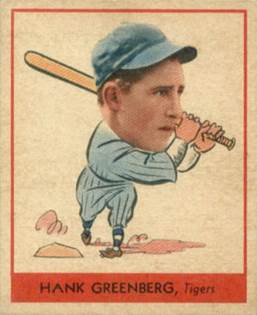
Roosevelt’s Green Light Letter: In early 1942, baseball Commissioner Kenesaw Landis reached out to President Franklin Roosevelt to see if baseball should cancel the season. In what became known at the “Green Light” letter, Roosevelt advised against shutting down baseball:
“I honestly feel that it would be best for the country to keep baseball going. There will be fewer people unemployed and everybody will work longer hours and harder than ever before.
And that means that they ought to have the chance for recreation and for taking their minds off their work even more than before.
Baseball provides a recreation which does not last over two hours or two hours and a half, and which can be got for very little cost. And, incidentally, I hope that night games can be extended because it gives an opportunity to the day shift to see a game occasionally.
Here is another way of looking at it – if 300 teams use 5,000 or 6,000 players, these players are a definite recreational asset to at least 20,000,000 of the fellow citizens – and that in my judgment is thoroughly worthwhile.”
Although President Roosevelt gave the green light to baseball, the players remained subject to the draft. Some 500 MLB players served in the war, including Ted Williams, Stan Musial, Bob Feller, Yogi Berra and Joe DiMaggio.
.
The 1942 Season: While the troops were fighting the racist Hitler, there were troubling discrimination issues at home. Some 110,000 Japanese-Americans were interned. Jim Crow was widespread, and baseball remained an apartheid sport. This meant that there were two World Series in 1942. In the Negro Leagues, the Kansas City Monarchs beat the Washington-Homestead Grays.
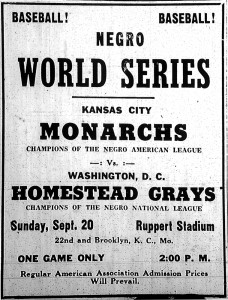
In MLB, The Cardinals beat the Yankees. Another big winner was this beer company ad in the 1942 World Series program. Baseball metaphors abound.
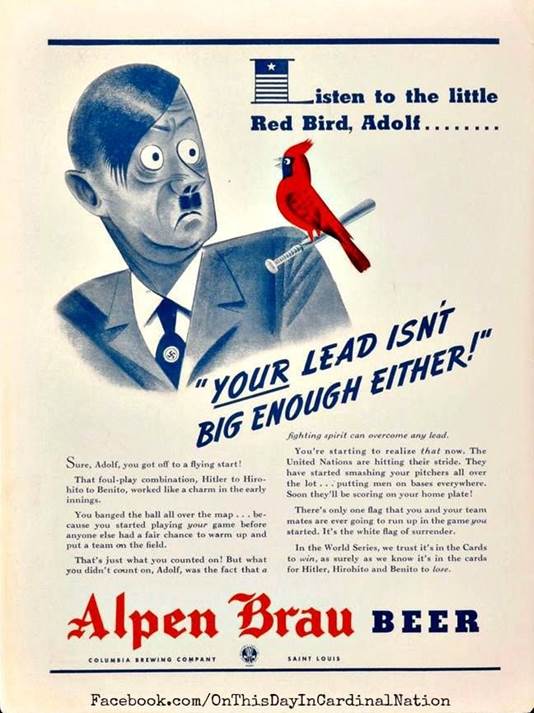
The rise of Nazism and its brand of white supremacy led to another movement in the 1942 season. Lester Rodney of the Daily Worker (yes, the Communist paper) initiated a campaign called “Can You Read, Judge Landis.” Commissioner Landis had not only been a strong supporter of baseball segregation, he even tried to stop white players from playing against the Satchel Paige All-Stars to benefit the war effort. He told his teams to not rent their parks for such integrated events. Rodney’s campaign spurred social groups and unions to write to Landis in support of integrating baseball. The messages were persuasive…”It is the expression of Hitlerism we are all seeking to destroy…embracing all races, colors and creeds is particularly necessary at this point in order to win the war against Fascism…”. Landis did not appreciate the logic.
Babe Ruth and Hitler: Dorothy Thompson was the first American journalist expelled from Nazi Germany. In 1942, she organized 48 prominent German-Americans to sign an open letter denouncing Hitler:
“We, Americans of German descent, utterly repudiate every thought and deed of Hitler and his Nazis. Other Americans must know where we, and you, stand.”
The letter appeared in the New York Times and nine other papers. By far the best known German-American to sign the letter was Babe Ruth.
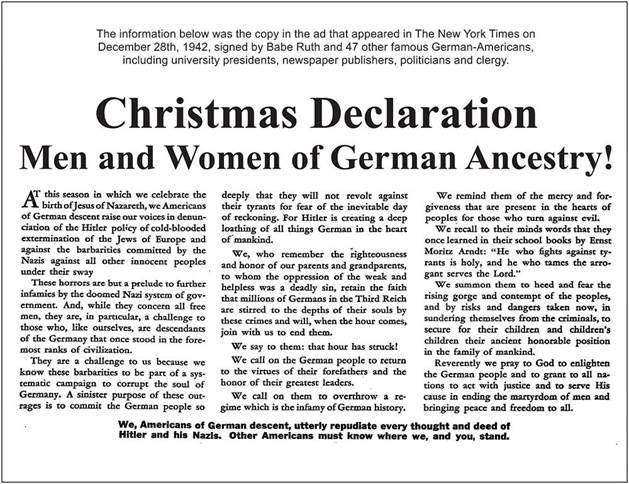
Presidential Opening Day Pitch – Wartime: President Roosevelt threw out the ceremonial first pitch at the Senators game in DC on opening day in 1941. Later that year came Pearl Harbor. Roosevelt never returned to throw out the first ball again, but he had representatives of his administration do so. For the opening game on April 14, 1945, that person was to be Vice President Harry Truman. But Roosevelt died two days before the game. Truman sent his handwritten regrets to Clark Griffith, President of the Washington team: “We must postpone it now. I’m up to my neck and must think of my terrible responsibilities for some days to come.”
V-E Day, Baseball in Europe: Germany surrendered on May 8, 1945. The army needed activities for the troops, and baseball was one of the most popular. Leagues were formed, and most of the games were played in the Hitler Youth Stadium in Nuremberg. This former home of Nazi rallies was renamed Soldiers’ Field and the swastikas were painted over. The 71st Division won the championship of the German-based teams, and an “ETO World Series” (European Theater of Operations) was set up to play the French-based champion, the Overseas Invasion Services Expedition (OISE) All-Stars. The 71st had major leaguers Ewell “The Whip” Blackwell and Harry “The Hat” Walker and was favored. The OISE had no name players, but followers of the Negro Leagues would have recognized Willard “Home Run” Brown (Kansas City Monarchs) and pitcher Leon Day (Newark Eagles). With Day and Brown providing heroics, OISE won the five-game series 3-2. In the team photo below, Day is at the far right, bottom row, and Brown is next to him.
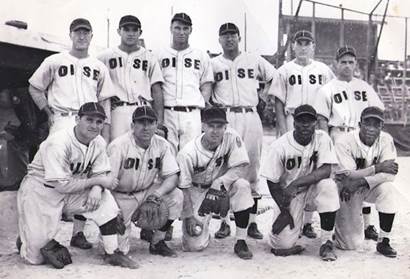
V-J Day, Baseball in America: Japan surrendered on September 2, 1945. Just six days later, President Truman threw out the first pitch at a Washington Senators game. It was more than a ball game. It was a signal that peace had returned along with normalcy for baseball and the country.
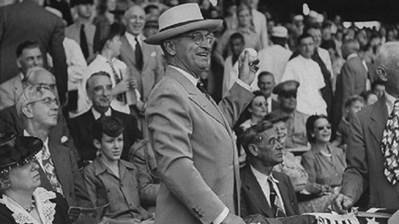
The two teams that Truman saw that day, the Browns and Senators (both usually also-rans), fought until the last day of the pennant race with the Detroit Tigers. Hank Greenberg had returned from the war and rejoined the Tigers on July 1. To avoid a post-season playoff, the Tigers needed to beat the Browns on the last day of the season. In the ninth, the Browns were leading 3-2 when Greenberg hit a grand slam for the Tigers victory. Detroit went on to win the 1945 World Series over the Cubs.
The next spring, Truman reinstated the tradition of the opening day first pitch and did it every year during his time in the White House. He was the first to throw left-handed, and the ambidextrous Truman threw two first pitches in 1950, one left and one right.
Jackie Robinson and Hank Greenberg: Commissioner Kenesaw Landis died in November of 1944. In April of 1945, baseball got a new sheriff – Commissioner Happy Chandler. When a pair of black sportswriters asked where he stood on integration, Chandler said “I’m for the Four Freedoms, and if a black boy can make it in Okinawa and go to Guadalcanal, he can make it in baseball.” Branch Rickey signed Jackie Robinson on October 23, 1945.
Robinson had been in the Army as an officer, but was court martialed after he refused to sit at the back of an army bus. He was acquitted, and after his honorable discharge, he joined the Kansas City Monarchs for the 1945 season. Rickey signed him at the end of the season. Robinson played minor league ball in Montreal and moved up to the Dodgers in 1947 for his first major league season. That same year, Hank Greenberg moved to the Pittsburgh Pirates for his last season. This led to a memorable encounter.
On May 15, 1947, Robinson and the Dodgers were playing in Pittsburgh. Robinson laid down a bunt and raced to first. The pitcher’s throw pulled Pirates first baseman Hank Greenberg off the bag and the two collided. The ball fell free and Robinson went on to second. After Robinson walked in the next inning, Greenberg asked if Robinson had been hurt in the collision. They then discussed the slurs directed to Robinson from the fans and the Pirates clubhouse. Greenberg was familiar with the situation – before a black was allowed to play, Jewish players had often been the target of racial epithets. Greenberg told Jackie to “Stick in there. You’re doing fine. Keep your chin up.” He offered to give Robinson advice from his own experience with discrimination. Robinson told the press “Class tells. It sticks out all over Mr. Greenberg.” The two players traded complimentary comments in the press and in their autobiographies. The relationship was commemorated in this card from the 2002 Fleer “Rival Factions” series:
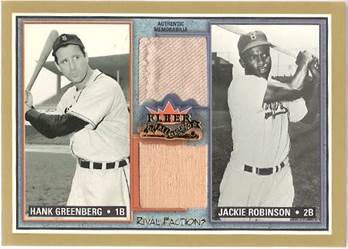
Jackie Robinson and the Klan: Jackie Robinson was Rookie of the Year in 1947. Bill Veeck’s Cleveland Indians won the World Series in 1948 with Larry Doby and Satchel Paige playing major roles. Integration was moving slowly, but in the right direction. President Truman nudged things along when he integrated the armed forces and the federal workplace by executive order in 1948.
The Klan was not happy. On April 8, 1949, the Dodgers were scheduled to play an exhibition game hosted by the minor league Atlanta Crackers (yes, some irony in that team name). A Grand Dragon of the Ku Klux Klan objected to the game if Jackie Robinson and Roy Campanella were allowed to play. The Grand Dragon’s demand was colorfully reported by Arthur Daley of the New York Times: “Somehow or other the folks up North had grown to believe that the Klan was a disgraced and impotent bunch of bigots who childishly liked to play cops and robbers while wearing bed sheets, disowned and scorned by their own communities. But apparently they still are selling hate as their principal commodity.”
Branch Rickey said there would be no game without these two players. The Grand Dragon insisted that Jim Crow tradition be followed. He claimed to have 10,000 signatures of people who said they would never again attend a Crackers game. After a lot of verbal and legal sparring, the game went on and drew an overflow crowd that required ropes across the outfield to accommodate the extra fans. Sounds like a precursor of the large Boston crowds that came out last week to protest the white supremacy rally.
White Flag – Not Yet: I now return to a sentence from that beer ad above, telling Hitler “There is only one flag that you and your team mates are ever going to run up in the game you started. It’s the white flag of surrender.” That turned out to be true for Hitler. But his bigotry lives on in the neo-Nazis of today who wave his Nazi flag and salute his swastika. In Charlottesville, they chanted “Jews will not replace us” and the Nazi slogan “Blood and soil.” They carried torches and marched side-by-side with their fellow racists of the Klan. As the Charlottesville horror was occurring, someone posted a photo of a Klan rally from a month earlier in Charlottesville. It tells so much. A black police officer doing his duty in front of a guy with a sign saying “Jews are Satan’s Children“, a costumed Klansman and a guy making a Nazi salute.
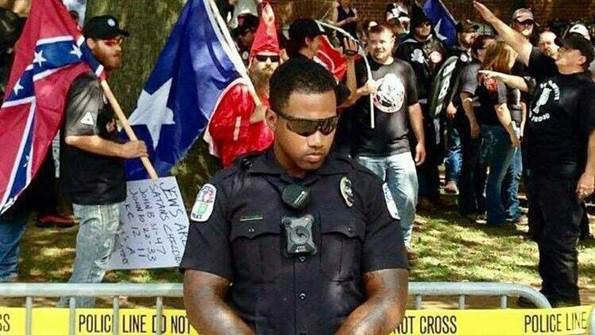
The Good News: As sad as this is, there is some good news. When bigots march, so do anti-racists. Most of the politicians find common ground. Businesses choose not to sit on the sidelines. I was proud when our law firm took a stand last week with this message to our employees from CEO Russ Welsh:
With the horrific words and actions of so called white nationalists in Charlottesville this past weekend, now is the time to celebrate and reinforce our values of diversity and inclusion. We want to make clear that while violence by anyone is unacceptable, there is no equivalence between the hate mongers who espouse racist and anti-Semitic ideology and those who protest against these views. We deplore and reject the comments of our political leaders who fail to recognize this distinction and to denounce these evil, anti-American ideologies. Our firm stands resolutely against these groups and their beliefs.
A couple of memorable quotes to keep in mind:
Ben Franklin: “Justice will not be served until those who are unaffected are as outraged as those who are.”
Martin Luther King, Jr.: “In the end we will remember not the words of our enemy, but the silence of our friends.”
Hank Greenberg and Jackie Robinson beat back the Nazis and the Klan. It’s our turn to step up to the plate.
If we do, before long, we can tell a new joke…
“Why does the white supremacist get hit with a baseball? He Klan Nazi it coming.”
One thought on “Hot Stove #50 – Hitler, the Klan and Baseball”
Comments are closed.